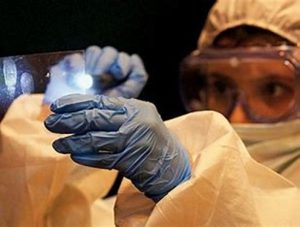Forensic science has made significant strides with new technologies enhancing crime-solving capabilities. The Foldscope, an affordable, portable paper microscope, allows on-site analysis of forensic samples like blood and hair, expediting investigations and reducing lab backlogs. Proteomic analysis, examining the complete set of proteins in a sample, offers insights beyond DNA, such as detecting undetectable venoms and determining a victim’s age and environmental conditions at the time of death. Nanotechnology enables precise detection of drugs, explosives, and biological agents by examining materials at the molecular level. Artificial intelligence enhances digital forensics, crime scene analysis, fingerprint and handwriting comparison, and suspect identification, though it necessitates careful ethical considerations. Additionally, fluorescent carbon dot powders improve fingerprint visibility under UV light, facilitating analysis even when prints are smudged or contaminated. These advancements collectively revolutionize forensic science, making investigations faster, more accurate, and more comprehensive.

Alarming Rise in Missing Girls and Women in India: A Detailed Analysis
According to NCRB Report between 2019 and 2021, India witnessed


